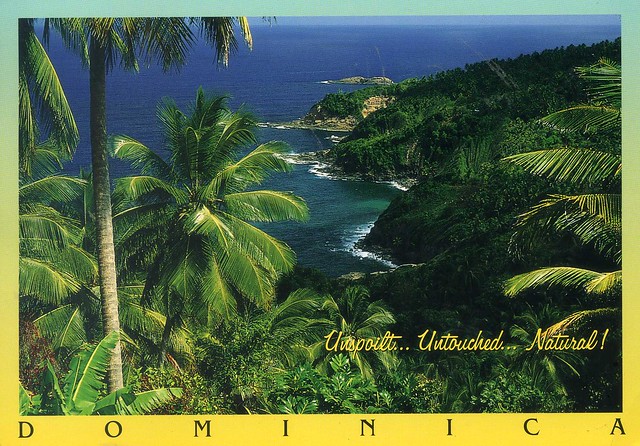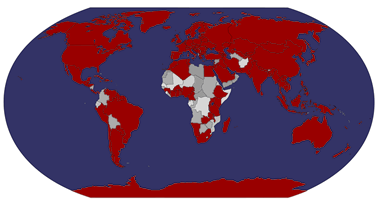Today's last card is a real treat. Dominica is one of those countries I barely even know of before I joined Postcrossing, and I never thought I'd ever be lucky enough to actually receive a postcard from there. ...but I was, earlier this year! Gilles of Belgium is one lucky person, having been to so many exotic countries. I'd love to visit the Caribbean one day, too, and a place like the one on this postcard really does look like heaven on earth.
Dominica is an island nation in the Lesser Antilles region of the Caribbean Sea, south-southeast of Guadeloupe and northwest of Martinique. Its size is 750 square kilometres and the highest point in the country is Morne Diablotins, which has an elevation of 1,447 metres. The Commonwealth of Dominica had a population of 71,293 at the 2011 Census. The capital is Roseau.
Dominica has been nicknamed the "Nature Isle of the Caribbean" for its unspoiled natural beauty. It is the youngest island in the Lesser Antilles, still being formed by geothermal-volcanic activity, as evidenced by the world's second-largest hot spring, Boiling Lake. The island features lush mountainous rainforests, home of many rare plant, animal, and bird species. There are xeric areas in some of the western coastal regions, but heavy rainfall can be expected inland. The Sisserou Parrot (also known as the Imperial Amazon), the island's national bird, is featured on the national flag. Dominica's economy is heavily dependent on tourism, agriculture and heavy taxation.
Christopher Columbus named the island after the day of the week on which he spotted it, a Sunday (dominica in Latin), November 3, 1493. In the hundred years after Columbus's landing, Dominica remained isolated, and even more Caribs settled there after being driven from surrounding islands as European powers entered the region. France formally ceded possession of Dominica to Great Britain in 1763. Great Britain then established a colony on the island in 1805.
The emancipation of African slaves occurred throughout the British Empire in 1834, and, in 1838, Dominica became the first British Caribbean colony to have a legislature controlled by a black majority. In 1896, the United Kingdom reassumed governmental control of Dominica, turning it into a Crown colony. Half a century later, from 1958 to 1962, Dominica became a province of the short-lived West Indies Federation. In 1978, Dominica became an independent nation.
Subscribe to:
Post Comments (Atom)





 Maroon
Maroon 










































































































































































No comments:
Post a Comment